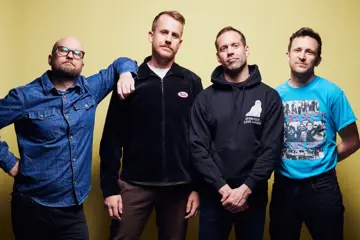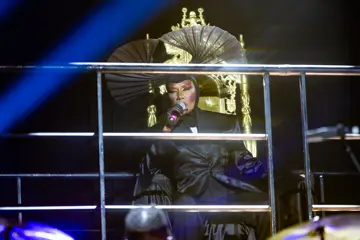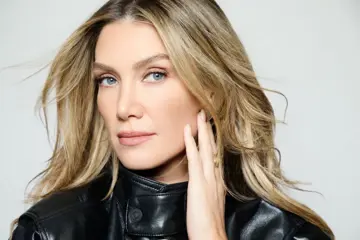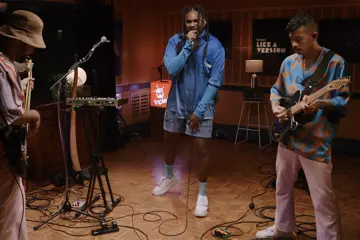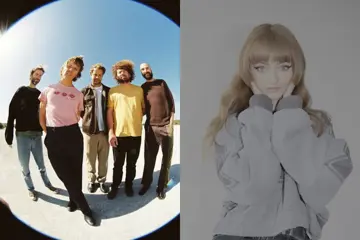 Matmos
MatmosMatmos are known for their avant-garde electronica, but the Americans instil it with eccentricity and humour. Who else would record a clubby song titled Very Large Green Triangles? Drew Daniel and MC (Martin) Schmidt, bound for Sydney Festival 2014 on their first Australian trek, will play material both new and vintage. “We've been a band for 20 years – there's an extensive back catalogue – but you don't want to be delivering the hits, especially when you don't have any hits,” quips Daniel, on speakerphone at home with Schmidt.
Forming in late '90s San Francisco, Matmos, their handle ostensibly inspired by the evil goo powering the city of Sogo in Roger Vadim's '60s sci-fi classic, Barbarella, developed a mode of alt-pop, combining musique concréte with IDM. They've manipulated the sound of everything from whoopee cushions to surgical procedures to, infamously, “amplified crayfish nerve tissue”. The duo's eponymous debut came out in 1997. Later, Björk approached them to work on Vespertine (they had remixed Homogenic's Alarm Call). Matmos toured twice with the Icelandic auteur as band members. After Daniel completed a PhD on the cult of melancholy, he accepted a post as Assistant Professor in the English Department at John Hopkins University in Baltimore, where Matmos now reside.
In 2013 Matmos presented a highly conceptual ninth album, The Marriage Of True Minds, based on experiments with telepathy, via their new label home Thrill Jockey Records. Notably, it features more by way of vocals from the likes of Dan Deacon. Matmos have also been involved in Robert Wilson's The Life And Death Of Marina Abramović, starring the pioneering Serbian performance artist (and Lady Gaga's current mentor), alongside their pal Antony Hegarty. “We are a very small cog in a giant, complicated automobile,” Schmidt stresses.
As life partners, Daniel and Schmidt can second-guess each other, the theme of The Marriage… somewhat personal. “We have been a couple for 21 years last month and there is a disturbing tendency to order exactly the same thing off the menu without discussing it beforehand,” Schmidt jokes. “If he gets the lobster thermidor, and I was thinking about the lobster thermidor all along, I feel like I can't have the lobster thermidor because he ordered it, and then I have to get a super-healthy salad or something instead – and that's frustrating for me!” Ditto when Matmos improvise on stage. “We'll very frequently both change our sounds at exactly the same time,” Daniel says. “I think it's dangerous to believe in progress past a certain point. As we all know with punk-rock bands, the first album is almost always the best. In our case, our model is closer to experimental groups like [the '70s UK outfit] Nurse With Wound where they vary every time and you don't really know what direction they're going to go in. I wouldn't say that we've progressed, but we've certainly transformed ourselves. I mean, the most recent record, for example, has a doom metal song [a subversive cover of Buzzcocks' ESP] on it and tap-dancing – that's not something that I would have predicted in 1997 when we were making records that sounded a little bit like drum 'n' bass and a little bit like musique concréte… And I like that freedom.”
Don't miss a beat with our FREE daily newsletter
Matmos were steered into popdom by Björk. “The most radical thing was playing music in such a different context,” recalls Schmidt. “One of our first shows with her was at [New York's] Radio City Music Hall. I think the highest number of people we had ever played to before we played with her was, like, maybe 200. Radio City Music Hall holds 6000 people.” Teaming with Björk was an educational experience, too. Though the icon is hardly conventional, she's more so than Matmos. “We had to learn what chords are and what chord changes are – we still didn't know about that before dealing with Björk,” Daniel divulges. Schmidt kids that they'd “learn how to make pop music.” Says Daniel, “I think after Björk I can hear in our records that we're more ambitious about arrangements and we try to pull off more musical forms than we did at the start of our working – like the records changed dramatically as a result of the collaboration with her.” Schmidt concurs: “Yeah, I guess she sort of taught us maybe in a way that we could use anything, curiously for us (laughs) – and then you could use real musical instruments.” Indeed, Matmos now add strings and horns – and not merely sampled crayfish nerve activity – to their wonderfully wonky, weird EDM.




